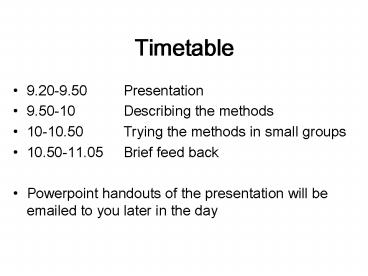Timetable - PowerPoint PPT Presentation
1 / 16
Title: Timetable
1
Timetable
- 9.20-9.50 Presentation
- 9.50-10 Describing the methods
- 10-10.50 Trying the methods in small groups
- 10.50-11.05 Brief feed back
- Powerpoint handouts of the presentation will be
emailed to you later in the day
2
What is participatory appraisal?
- Definition A method for obtaining information
about local needs issues for working
collectively to develop more relevant,
community-based solutions - Methods Mapping, sequencing, listing, comparing,
counting, estimating and scoring, sorting and
linking - Also known as RRA, PRA, PLA, PAR, etc
3
Origins of RRA/PRA Chambers 1992
4
Appeal of RRA
- Accelerating rural change need for good and
timely information - Development experts confidence in their
knowledge the problem. Solution incorporating
local knowledge/s - Anti-poverty biases of rural development
tourism (e.g. spatial, project, person,
seasonal) - Insulation isolation of senior (male)
practitioners - Survey slavery (time consuming to administer
analyse data often misleading) - New focus on cost-effectiveness (recognising
trade-offs between depth, breadth, accuracy, and
timeliness)
5
Evolution of PRA for empowerment
- Applied social anthropology agro-ecosystems
analysis farming systems research PAR - RRA ? PRA
- New methods (e.g. mapping, matrices)
- Discovery that "they villagers/lowers can do
it" - Methodological shift from dominating to
empowering, closed to open, verbal to visual,
individual to group measuring to comparing - Search for practical approaches and methods for
decentralisation, democracy, diversity,
sustainability, community participation,
empowerment.... - Chambers 2003
6
RRA/PRA continuum
7
Key principles
- Offsetting biases
- Direct contact
- Reversals, e.g. from dominating to facilitating
(handing over the stick) teaching villagers to
learning from them - Enabling participants to conduct their own
analyses - Optimal ignorance appropriate imprecision
- Triangulation (different methods, sources
informants) - Seeking diversity and difference (e.g. including
historically marginalised) - Critical self-awareness about attitudes and
behaviour - Rapid progressive learning (e.g. embracing error,
continuous improvement,) - Culture of sharing (NGOs, Govt. local people)
8
Visual methods
- Participatory modelling mapping
- Aerial photograph analysis
- Seasonal calendars
- Daily activity profiles
- Historical profiles trend analyses
- Time lines chronologies
- Matrix scoring
- Preference ranking
- Venn network diagrams
- Systems flow diagrams
- Pie bar charts
9
Members of a Womens Organisation in N. Pakistan
draw a map of their village 1995
10
Members of a Village Organisation in N. Pakistan
draw a map of their village 1995
11
Mixed group of villagers from N. Pakistan carry
out Wealth Ranking, supervised by VO leader 1995
12
Interviewing sampling
- Semi-structured interviewing
- Transect walks group walks
- Work sharing
- Wealth ranking
- Direct observation
- Focus groups
- Key informants
- Ethnohistories futures possible
- Matrices
- Traditional practices beliefs
13
Internal critique1
- Rushing dominating in the field (rapid and
wrong) - Lecturing instead of listening, watching and
learning - Interrupting and interviewing people while they
are doing PRA exercises - Imposing external categories values (cant
learn from informants makes them appear
ignorant) - Gender bias (selection of informants
researchers) - Community meetings dominated by local elites
- Researchers reluctant to spend time in the field
or stay overnight in villages
14
Internal critique2
- Taking local people's time without recompense
- Producing shopping lists of requests raising
expectations which cant be fulfilled - Using the label without the substance
- Putting methods before behaviour attitudes
- Emphasising the visual over the experiential
product - Accelerated PRA
- Rigid, routinised applications
- No recognition that good participation PRA
requires institutional change by commissioning
bodies
15
Participation - Paradigm shift OR
De-politicisation
- Co-option
- Display
- But Exit/misbehaviour co-option from below?
- Uncritical celebration of the community -
insufficient awareness of diversity
differentiation - Language of emancipation disguises
unreconstructed project of modernisation - Personal reform stressed over political struggle
(individualistic voluntaristic Christian
metaphors of transformation) - Empowerment generally not key issue for
poor/disadvantaged
16
The 3 Tyrannies
- Decision making control
- The group
- Methods
- Those themes that are most apparent to us are
the naivety of assumptions about the authenticity
of motivations behaviour in participatory
processes how the language of empowerment masks
a real concern for managerial effectiveness the
quasi religious associations of participatory
rhetoric practice how an emphasis on the
micro level of intervention can obscure, indeed
sustain, broader macro-level inequalities
injustice - Cooke Kothari 2002, p.13-14































